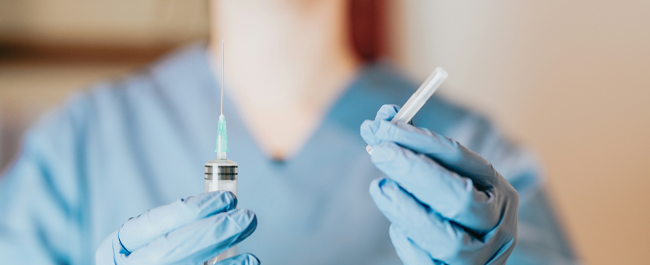Helping policy makers create an effective vaccination strategy for meningitis B

Research by the University of Bristol supported the UK government’s decision to introduce a new vaccine for UK infants that has led to a 75% reduction in cases.
Research highlights
- Mathematical models inform UK policy on MenB vaccination.
- Cases in children eligible for vaccine fall by 75%.
- Cost-effectiveness analysis helps NHS save millions on programme implementation.
Meningitis B (MenB) is a devastating infectious disease that is a leading cause of death in young children. The disease progresses rapidly, even with appropriate treatment, and can leave survivors with severe complications including amputation and neurological damage.
Thanks in part to research led by Bristol, the UK has played a leading role in the fight against the disease with its pioneering use of a vaccine – Bexsero – that is both effective at reducing cases and is cost-effective for the NHS and the population as a whole.
Mathematical models support decision making
Bristol’s work in this area began in 2007 when a team at the Faculty of Health Science started researching mathematical models for MenB vaccines that incorporated both epidemiological and economic data.
The novel models they developed could predict two key factors: which MenB vaccine strategy could avert the most cases, and what the maximum vaccine cost for the NHS should be for the programme to be cost-effective.
The value of Bristol’s work came to the fore when the EU granted a license for the new Bexsero vaccine in 2013. The Joint Committee on Vaccination and Immunisation (JCVI), which advises the government on all new vaccines, used evidence provided by the Bristol research that children under 12 months were the most at risk of invasive disease.
The research team also showed that immunising this group could be cost-effective if the vaccine was procured at a low price.
Using this analysis to form its decision, in September 2015 the JCVI directed that the UK should become the first country in the world to routinely offer the Bexsero vaccine to infants at 2, 4 and 12 months of age.
Impact on public health
The decision to introduce the Bexsero vaccine has helped cut cases dramatically by protecting children and reducing transmission.
Cases in vaccine-eligible infants halved in the first 10 months of the programme, irrespective of the infant’s vaccination status. Subsequent data have also shown a sustained reduction in MenB cases compared with pre-vaccine levels.
By the third year of the programme, MenB cases fell by 75% in children who were fully eligible for vaccination. Overall, the UK had immunised 92.5% of 12-month-olds by 2020.
Cost savings for the NHS
By considering the general consequences for population health alongside the benefits for those who directly benefit from a vaccination programme, the University’s models also helped the JCVI to recommend that the UK could only introduce Bexsero cost-effectively if it procured the vaccine at a cost-per-dose 10 times lower than the list price.
Although the final price paid for all vaccines in the UK is confidential, it is estimated that this analysis is saving the NHS over £100m a year.
Most importantly, the proven effectiveness and economic viability of the UK vaccine strategy means that fewer people have to cope with the impact of this lethal and disabling disease.
The Joint Committee on Vaccination and Immunisation (JCVI), which advises the government on all new vaccines, used evidence provided by the Bristol research that children under 12 months age group were the most at risk of invasive disease.
Connect with the researcher
Professor Hannah Christensen, Professor of Infectious Disease Epidemiology, Bristol Medical School
Cite the research
- Christensen H, Hickman M, Edmunds WJ, Trotter CL. Introducing vaccination against serogroup B meningococcal disease: An economic and mathematical modelling study of potential impact. Vaccine. 2013; 31(23): 2638-46.
- Christensen H, Trotter CL, Hickman M, Edmunds WJ. Re-evaluating cost effectiveness of universal meningitis vaccination (Bexsero) in England: modelling study. BMJ. 2014; 349:g5725.
- Christensen H, Irving T, Koch J, Trotter CL, Ultsch B, Weidemann F, Wichmann O, Hellenbrand W. Epidemiological impact and cost-effectiveness of universal vaccination with Bexsero® to reduce meningococcal group B disease in Germany. Vaccine. 2016; 34(29): 3412-9.